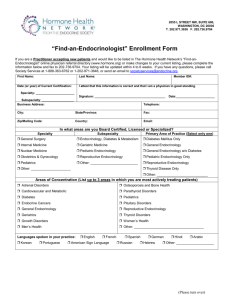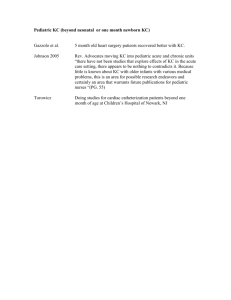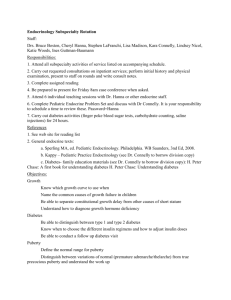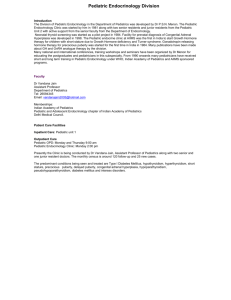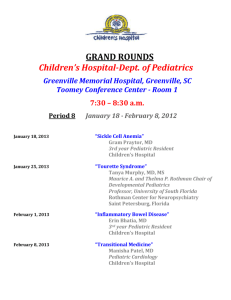Developmental Origin.. - University of Michigan
advertisement
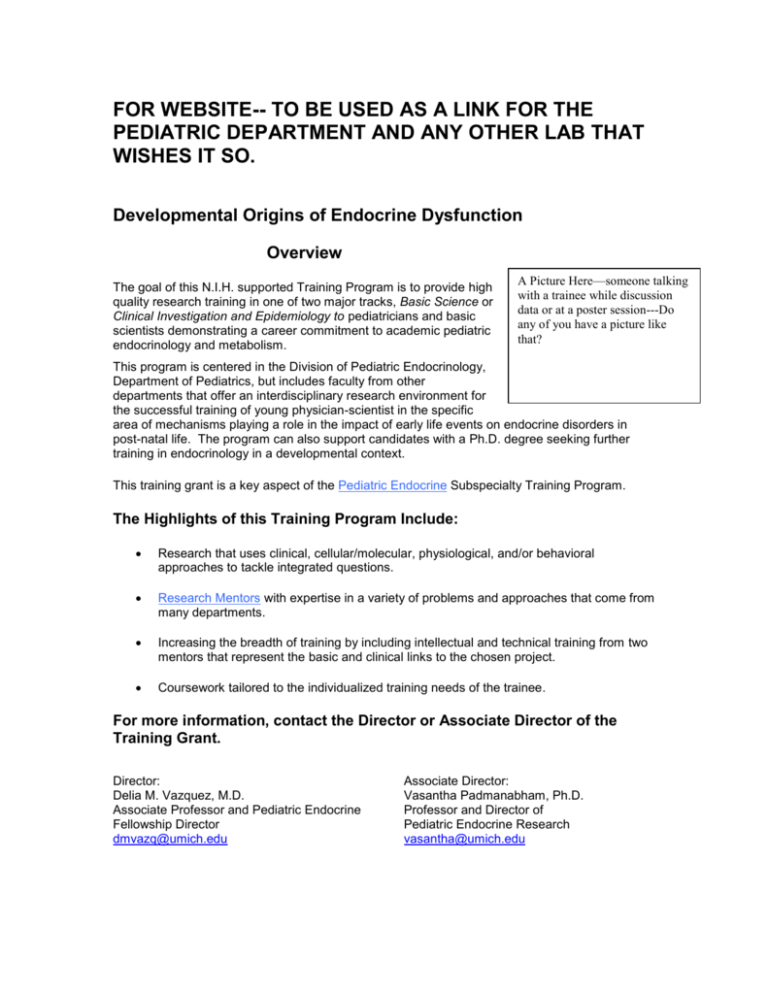
FOR WEBSITE-- TO BE USED AS A LINK FOR THE PEDIATRIC DEPARTMENT AND ANY OTHER LAB THAT WISHES IT SO. Developmental Origins of Endocrine Dysfunction Overview The goal of this N.I.H. supported Training Program is to provide high quality research training in one of two major tracks, Basic Science or Clinical Investigation and Epidemiology to pediatricians and basic scientists demonstrating a career commitment to academic pediatric endocrinology and metabolism. A Picture Here—someone talking with a trainee while discussion data or at a poster session---Do any of you have a picture like that? This program is centered in the Division of Pediatric Endocrinology, Department of Pediatrics, but includes faculty from other departments that offer an interdisciplinary research environment for the successful training of young physician-scientist in the specific area of mechanisms playing a role in the impact of early life events on endocrine disorders in post-natal life. The program can also support candidates with a Ph.D. degree seeking further training in endocrinology in a developmental context. This training grant is a key aspect of the Pediatric Endocrine Subspecialty Training Program. The Highlights of this Training Program Include: Research that uses clinical, cellular/molecular, physiological, and/or behavioral approaches to tackle integrated questions. Research Mentors with expertise in a variety of problems and approaches that come from many departments. Increasing the breadth of training by including intellectual and technical training from two mentors that represent the basic and clinical links to the chosen project. Coursework tailored to the individualized training needs of the trainee. For more information, contact the Director or Associate Director of the Training Grant. Director: Delia M. Vazquez, M.D. Associate Professor and Pediatric Endocrine Fellowship Director dmvazq@umich.edu Associate Director: Vasantha Padmanabham, Ph.D. Professor and Director of Pediatric Endocrine Research vasantha@umich.edu Pediatric Endocrinology Training Program Faculty: Rank, Research Interest and Role MENTOR AND RESEARCH TRACK RANK RESEARCH INTEREST Christin Carter-Su, PhD Basic Science Track Professor, Molecular and Integrative Physiology William Herman, MD Basic Science Track Clinical Investigation Track Professor, Internal Medicine, Endocrinology and Epidemiology, Interim Director, Michigan Diabetes Research and Training Center Assistant Professor, Division of Kinesiology Growth/Diabetes: Growth hormone receptor structure and signal transduction pathways Diabetes: Diabetes, diabetes complications, diabetes and pregnancy, diabetes epidemiology, managed care and health economics Jeff Horowitz, PhD Basic Science Track Josephine Kasa-Vubu, MS, MD Clinical Investigation Track Theresa Lee, PhD Basic Science Track Ram Menon, MD Basic Science Track Martin Myers Jr., MD, Ph.D. Basic Science Track Vasantha Padmanabhan, PhD Basic Science Track Clinical Investigation Track Assistant Professor, Department of Pediatrics & Comm Diseases, Pediatric Endocrine Division Professor, Psychology & Neuroscience Professor, Pediatrics & Comm Diseases & Physiology, Director, Pediatric Endocrine Division and Molecular & Integrative Physiology Assistant Professor Internal Medicine and Physiology Professor, Pediatrics & Comm Diseases, Obstetrics and Gynecology, and Molecular & Integrative Physiology Obesity/Diabetes/Energy Metabolism: regulation of fat and carbohydrate metabolism Obesity/Reproduction: Hormonal regulation and insulin resistance in adolescent girls. Behavior/Reproduction/Stress: Regulation of adult sex behavior by prenatal exposure to excess sex steroids Growth/Diabetes/Reproduction: Growth hormone action, regulation of gene transcription, and role of growth factors in germ cell function. Obesity/Diabetes: Type 2 diabetes, energy balance, insulin, leptin Reproduction/Growth: Understanding the fetal origin of pubertal and adult reproductive and metabolic disorders and the impact of native steroids and estrogenic environmental pollutants in programming such defects. Growth: Mechanisms for regulation of gene expression by growth factors Jessica Schwartz, PhD Basic Science Track Professor, Molecular and Integrative Physiology; Director, Cellular and Molecular Biology Training Program Robert Thompson, PhD Basic Science Track Assistant Professor, Psychiatry and Reproductive Science Obesity/Reproduction: Modulation of processes leading to successful and unsuccessful reproduction, regulation lipid metabolism. Delia M. Vazquez, MD Basic Science Track Clinical Investigation Track Associate Professor, Pediatrics & Comm Diseases, Pediatric Endocrinology Division, and Psychiatry; Research Associate Stress/Growth/Behavior: Molecular brain mechanisms underlying longterm consequences of stress in growing organisms & Consequences of prenatal and postnatal stress in Jon Kar Zubieta, MD, PhD Clinical Investigation Track Professor, Center for Human Growth and Development Associate Professor, Departments of Psychiatry, Radiology and Mental Health Research Institute infants and children Stress Regulatory Mechanisms Examination of neurotransmitter systems and neuronal nuclei involved in the stress response and emotional regulation in humans with PET and fMRI The Department of Pediatrics Division of Endocrinology provides an exciting and vigorous research setting for faculty to perform the most advanced research aimed at understanding the pathophysiology of pubertal and adult endocrine, behavioral, growth and reproductive disorders. The Faculty employ a wide array of integrative molecular, cellular, physiologic and clinical approaches to explore fundamental questions relating to growth and differentiation of tissues and the genes and signaling pathways involved in organ function and dysfunction. Both animal and clinical models are effectively employed to gain an understanding of the origin and pathophysiology of pediatric and adult endocrine diseases and develop strategies to prevent or manage diseases. Faculty with both basic and clinical science research interests interact amongst themselves and with various members of the University faculty to provide exciting preclinical, translational and clinical research opportunities. An NIH funded Postdoctoral Research Training Program in Pediatric Endocrinology and Diabetes supported by 10 established investigators from 9 different departments at the University of Michigan facilitates high quality research training for both pediatricians and basic scientists demonstrating a career commitment to academic pediatric endocrinology and metabolism. The individual pediatric endocrinology faculty and their research areas are: Department’s Web site Delia M. Vazquez, M.D. Developmental Origins of Endocrine Dysfunction Postdoctoral positions are available to study mechanisms leading to Developmental Origins of Endocrine Dysfunction. The candidate can choose among several targeted areas of pediatric endocrine research – growth, metabolic syndrome, reproduction, and stress and behavior. Each research area is sponsored by one of 10 established investigators from 9 different departments at the University of Michigan who are exploring possible mechanisms of endocrine dysfunction at a cellular and molecular, physiological, behavioral and/or clinical level in a developmental context. Qualifications: Applicants must hold a Ph.D. in physiology, bioengineering, cell and molecular biology, or a related field from an accredited program. The position is funded by a recent training award from NIH-NIDDK. U.S. citizenship or permanent resident status is necessary due to training grant requirements. For further information visit our website at -------and contact individual investigators based on your research interest. Please provide a CV, three letters of reference (or contact information), and a detailed cover letter describing research experience, interests, and short and long term career goals. Post-Doctoral Opportunity Advertisement Another Version for Web site—which is too wordy…. Developmental Origins of Endocrine Dysfunction This new postdoctoral research training program in Pediatric Endocrinology and Diabetes at the University of Michigan has two main goals: 1) to provide high quality research training in one of two major tracks, Basic Science or Clinical Investigation and Epidemiology to pediatricians and basic scientists demonstrating a career commitment to academic pediatric endocrinology and metabolism, and 2) to provide an interdisciplinary research environment for the successful training of young physician-scientist in the specific area of mechanisms playing a role in the impact of early life events on endocrine disorders in post-natal life. The Pediatric Endocrinology Training Program (PETP) will provide 2 years of intensive postdoctoral research training for M.D. and Ph.D. trainees in an individualized and closely-mentored research training program designed to best fit each trainee’s skills and interests. For the physician-scientist, this program will be integrated with the ongoing ACGME approved fellowship program to include a one year intensive training in clinical pediatric endocrinology, which will be funded with nonNIH monies. In order to provide outstanding mentorship for the trainees, the PETP will be actively supported by 10 established investigators from 9 different departments at the University of Michigan, all with extensive research and mentoring experience within their respective areas of expertise. Each trainee will be mentored by a clinical/basic dyad of mentors to provide strong footing on hypothesis-driven translational research, centering on developmental origin of endocrine diseases. The trainee will choose among several targeted areas of pediatric endocrine research – growth, metabolic syndrome, reproduction, and stress and behavior. These areas are chosen because of the established strengths of other University of Michigan research programs and participating investigators in the PETP (see PETP Faculty, below). The overarching goal is to foster academic careers that will improve children's health and thereby, the health of the population in the United States.


